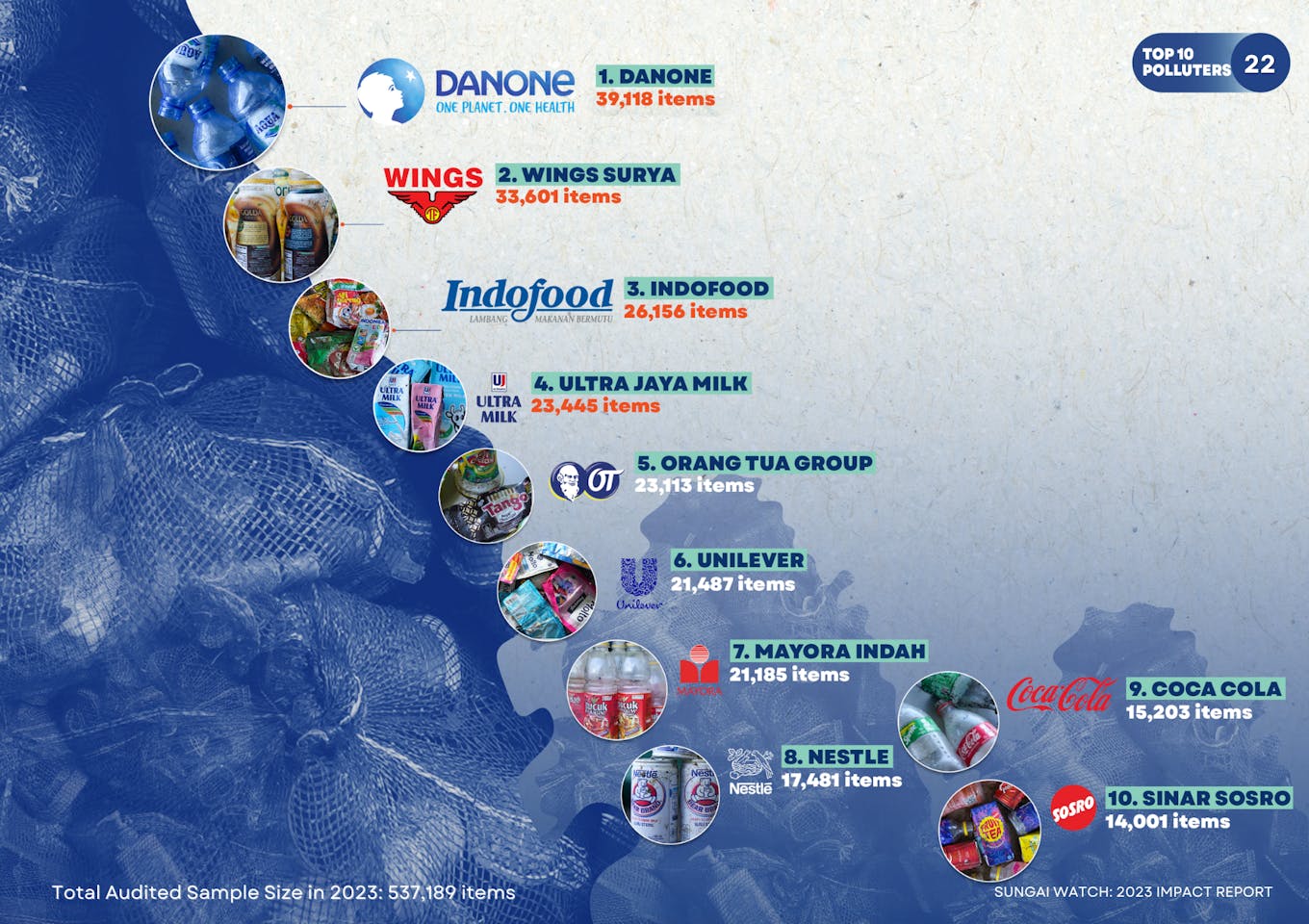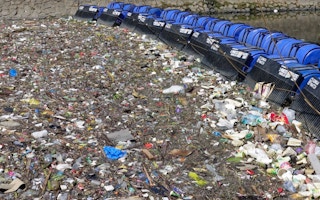Aqua, a bottled water brand made by French consumer goods giant Danone, has topped a new ranking of Indonesia’s biggest plastic polluters.
To continue reading, subscribe to Eco‑Business.
There's something for everyone. We offer a range of subscription plans.
- Access our stories and receive our Insights Weekly newsletter with the free EB Member plan.
- Unlock unlimited access to our content and archive with EB Circle.
- Publish your content with EB Premium.
A study of trash collected by Sungai Watch, a Bali-based environmental non-profit that deploys river barriers all over Indonesia to stop plastic debris from leaking into the ocean, found Aqua-branded single-use water bottles to be by far the most commonly littered items, followed by products made by Indonesian consumer goods firms Wings Group and Indofood.
Sungai Watch audited 537,189 pieces of rubbish collected from 268 river barriers in Bali and East Java last year, and published the data in its 2023 impact report.

Indonesia’s biggest river polluters [click to enlarge]. Image: Sungai Watch
One quarter of all polyethylene terephthalate (PET) bottles discarded into Indonesian rivers are Aqua-branded water bottles. Tea brand Mayora (15 per cent) and Coca-Cola (13 per cent) are also big contributors, and are listed in the ranking of top 10 polluters.
Only tea brand OT (19 per cent) contributes a higher proportion of plastic cups littering Indonesian rivers than Aqua (13 per cent), according to Sungai Watch’s data.
Eco-Business has approached Danone for comment.
In a sustainability commitment made in 2018, Danone pledged to remove more plastic from the environment than it uses by 2025. It also promised to increase the ratio of recycled plastic it uses to make its bottles to 50 per cent by 2025, targets that will prove difficult to meet as low oil prices bump up the price of recycled plastic.
The company has been awarded for its sustainability efforts, which have included a waste awareness and collection campaign #BijakBerplastic (“plastic wise”) and the creation of Indonesia’s first bottle made entirely from recycled plastic. Aqua is currently working with recycling companies in Indonesia to improve bottle collection efforts.
“Aqua are looking at options to support waste collection infrastructure, but at a very limited capacity compared to what they produce,” noted Alvaro Aguilar, head of logistics for Indonesian recycling firm Prevented Ocean Plastic.
Last week, another new report by global advocacy group the Center for Climate Integrity (CCI) called for plastic producers to be held accountable. The report said that plastic producers have known for more than 30 years that recycling is not an economically or technically feasible waste management solution.
Aqua was the first Indonesian company to be certified by B Lab, a London-headquartered certification scheme which rewards “beneficial corporations”, or B Corps, based on their social and environmental impact. Aqua attained B Corp status in 2018 and was re-certified in 2021. B Lab has faced scrutiny in recent months for enabling companies to greenwash.
In an open letter in 2022, a group of B Corps pressured the organisation to toughen its standards when Nestlé-owned coffee company Nespresso was certified. The group cited Nespresso’s “abysmal track record on human rights” and “extractive business model”. B Lab is currently reviewing its standards.
Indonesia is one of the world’s biggest contributors to marine plastic pollution, with 600,000 tonnes of waste entering the environment from the archipelago every year. Poor waste management infrastructure, weak regulations for polluters and cultural norms around waste disposal are commonly cited causes of the problem.
By far the most common items thrown into rivers in Indonesia are non-recyclable, for instance diapers and sanitary napkins, which make up 31 per cent of the rubbish retrieved by Sungai Watch’s river barriers.
The next most common waste type is plastic bags (16 per cent). Plastic sachets, which were introduced by companies such as Unilever and Procter & Gamble to sell products in smaller volumes to lower-income families, account for 6 per cent of river trash.
Other major river pollutants are fabrics, glass, sandals, PET bottles, cups, styrofoam and Tetrapak cartons, the study found.








